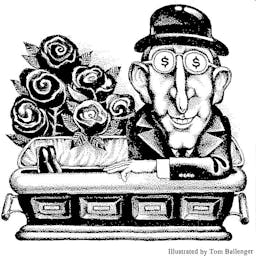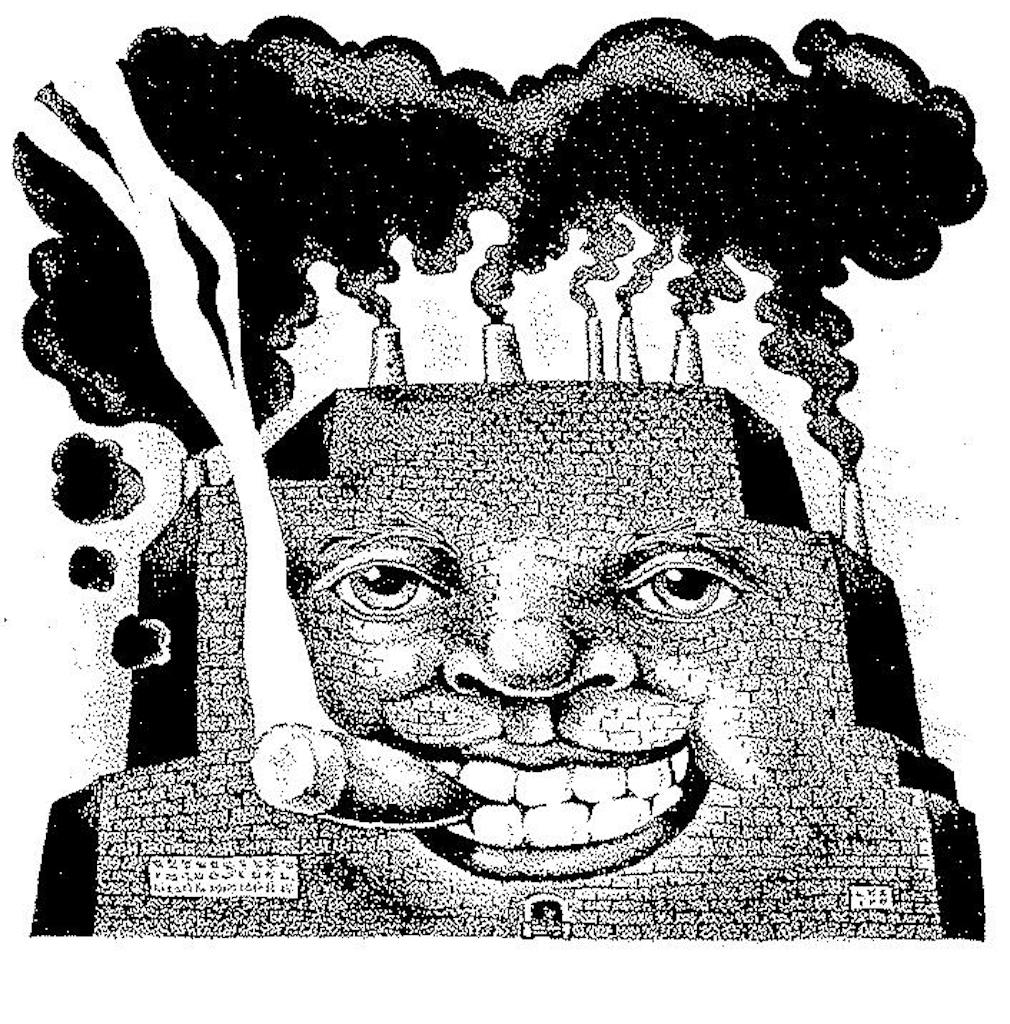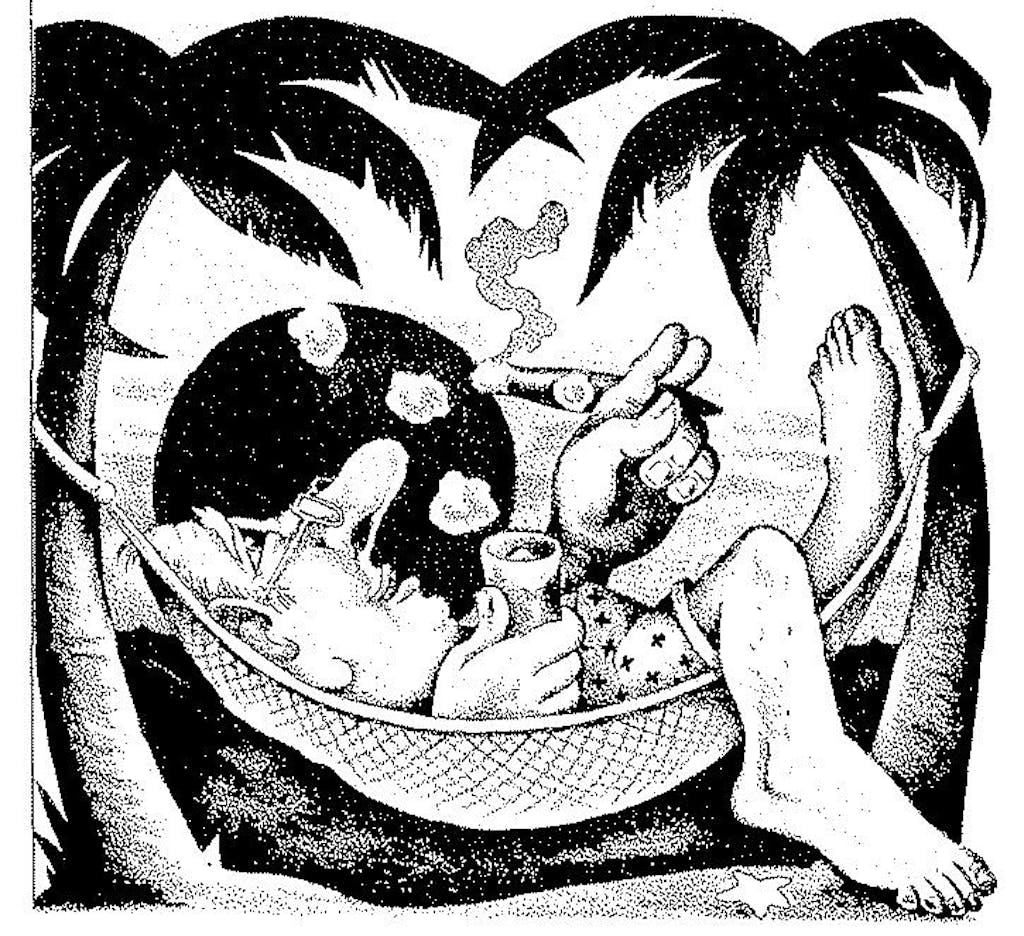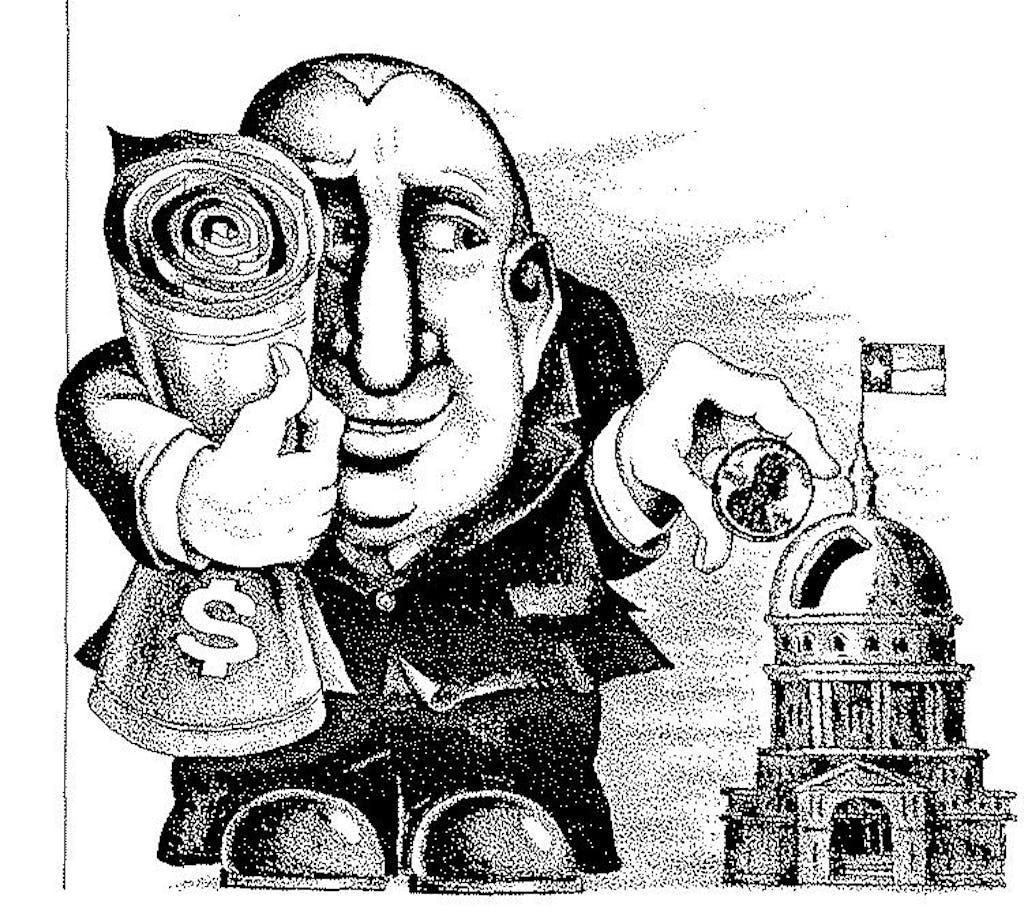It’s that time again. The Texas Legislature meets only in odd years—a designation some pundits swear has more to do with politics than mathematics. Two years have gone by but the Legislature is facing the same old issues: property tax reform, school finance, and just who should get their hands on the state’s bulging treasury surplus.
Since the Legislature can’t seem to make much progress toward solving these perennial problems, perhaps it should look at some others it can do something about. The lawmakers might start by looking at some of their own making: laws they passed which are unnecessary, undesirable, or unconstitutional—and sometimes all three.
BONANZA
The Coal Relinquishment Act
Suppose you decide to sell some land but elect to keep the mineral rights. One day oil is discovered in the neighborhood and you inform the new owner that you’re ready to drill. But when you arrive with your rig, he threatens you and refuses to let you on “his” land. Do you: (a) push him aside and go about your business? (b) go to court to enjoin him from interfering with you? (c) offer to pay him a reasonable fee for the use of the surface? (d) cave in and give him half the oil in exchange for his letting you use the land?
If you’re the State of Texas, you do (d). That’s what happened when oil and gas were discovered in West Texas. Stubborn West Texas ranchers who had bought state land at bargain-basement prices blackmailed the state into ceding half its oil and gas interest in a 1919 law known as the Relinquishment Act. Of course, that was long ago; nothing like it could happen today, right? Maybe not. But it sure could happen in 1967. That was when the Legislature gave away part of the interest in coal and lignite, two minerals that one day may be as valuable as oil and gas. But never let it be said that the Legislature didn’t learn something in the intervening 48 years. This time, instead of a 50-50 split, the state got 60-40.
R.I.P. – OFF
The Morticians Licensing Board
Almost every law that regulates a profession under the guise of protecting the public is really designed to protect the regulated profession as well. The acknowledged classic of this type is the act governing the funeral profession. In the words of one knowledgeable legislator, it is written “by funeral directors for funeral directors.”
Unlike some regulatory boards, which include token members of the public, the State Board of Morticians is composed entirely of funeral directors. Ordinary citizens are not invited, nor, for that matter, are their complaints. There’s no provision for consumer grievances—something the profession’s had plenty of in recent years.
Most of the regulatory laws find ways to restrict competition, and naturally the Morticians Act is no exception. It accomplishes this in the usual ways—by requiring licenses and prohibiting advertising about prices—but adds an ingenious twist. Current license holders have total control over entry to the profession, because newcomers can’t get a license without serving the longest apprenticeships since the heyday of medieval craft guilds. You can’t even escape the mortician by being cremated. State law forbids cremations within 48 hours after death—but it requires that bodies be embalmed within 24 hours.
IT STINKS
The Polluter Protection Clause
The biggest polluter of the Houston Ship Channel is the City of Houston, which dumps 100 tons of untreated sewage into the city’s bayous every day while the Texas Water Quality Board (WQB) benignly looks the other way. The city’s repeated violations of state water pollution standards did come to the attention of Texas Attorney General John Hill, who was ready to take the city to court: ready, yes; able, no. Standing in his way was a law that bars the attorney general from suing a polluter without prior authorization from the WQB.
That’s the same agency, you may recall, whose executive director once volunteered to be a defense witness in a pollution suit brought by the federal Environmental Protection Agency. That pretty well sums up the board’s attitude toward polluters, whom it would rather work with than prosecute. Predictably, the WQB has not exactly kept the attorney general’s office overworked with requests for lawsuits. On those rare occasions when the board finally runs out of patience, the victim is likely to be a small-time operator. It is no coincidence that the biggest judgments in pollution cases, including those against ARMCO and Champion Paper, came from suits filed by Harris County, not the state.
Some lawyers think that the restriction against the attorney general runs afoul of the Texas Constitution. “He’s elected by the people to be their lawyer,” says one. “But where pollution is concerned, he is forced to represent an appointed commission instead.” Meanwhile, the Clear Creek Basin Authority grew tired of waiting for the state to act and sued the city itself. That forced the WQB to enter the case as an intervener—along with its attorney, John Hill.
LIQUOR IS SLICKER
The Alcoholic Beverage Code
Emotional issues often produce bad laws. Some legislators will embrace almost any scheme that brings them a few extra votes—and there’s always a friendly lobbyist around to suggest such a scheme. Over the years there have been few issues more emotional in Texas than the fight between Wets and Drys, so it should be no surprise that the alcoholic beverage laws are a mess. Every interest group imaginable has its own special provision: wholesalers, package stores, convenience stores, mixed-drink permit holders, hotels, restaurants . . . everyone who handles Demon Rum is represented. Some of the provisions are so blatant that you wonder how anyone had the nerve to propose them:
- Don’t make the mistake of bringing your own bottle of wine to a restaurant whose wine list you don’t like. That’s not just bad manners; that’s a crime. The restaurant owners thought that one up.
- In the business world, most retailers buy from wholesalers on consignment. Not in the liquor business. Cash only: that’s what the law says. Score one for wholesalers.
- Don’t feel too sorry for the package stores. Restaurants and clubs with mixed-drink permits would dearly love to buy their liquor wholesale—but they can’t. The law requires them to buy from retailers only.
- Package stores must close by 9 p.m. That assures convenience stores which sell beer and wine three hours with no competition.
There are more, many more. In a rare moment of candor, one liquor lobbyist admitted, “They ought to repeal the whole damned thing and sell the stuff to adults just like eggs or lettuce. But we’ll fight ’em to the death if they try.”
GENTLEMEN PREFER BONDS
The Skiles Education Act
This one is complicated. It involves state finance, a difficult subject at best and one few legislators understand. But those who do are really putting one over on the rest of us.
One of the more sensible provisions of the much-maligned State Constitution is its pay-as-you-go requirement which prohibits the state from going into debt without first asking permission of its citizens. In short, this means no bond issues without a vote of the people. Weil, almost no bond issues. The Legislature has authorized a clever scheme which allows colleges to ignore the pay-as-you-go rule and gives them a blank check on the state treasury.
Here’s how it works. Starting in 1941 with the Skiles Act, colleges have been given blanket authority to issue bonds secured by tuition. On the surface this looks all right: there will always be plenty of tuition money to pay off the bonds. But… if tuition is used to retire the bonds, how can the college pay its teachers and stock its libraries? Only through ordinary appropriations from the Legislature. Look what has happened in this shell game: the Legislature could not issue bonds backed by the state treasury without a vote of the people. So, it let colleges issue bonds secured by tuition, and then replaced the obligated tuition money with dollars from, yes, the state treasury. Instead of the pea disappearing, though, what got lost was your right to vote. Something else disappeared, too: about $60 million. That’s how much more tuition bonds cost than state general obligation bonds, which bear a lower interest rate.
“You’re damned right it’s a subterfuge,” says one senator kindly disposed toward academia. “And if folks ever figure it out, we’ll just think up another one.”
EASY RIDERS
The Legislative Retirement Act
For years legislators begged Texas voters to give them a pay raise above the $400 a month provided in the State Constitution. For years the voters turned them down. If you were feeling guilty, don’t. They got even. In fact, they may even be a little ahead, now that the public has finally relented and boosted their pay to $600 a month. You see, the Legislature has written itself one of the fattest, most comfortable, most outrageous retirement programs the mind of man has ever devised.
Most retirement plans are based upon a simple premise: you contribute a percentage of your salary now, you get back a percentage of your salary later, and the two should be roughly proportional. Not the Legislature’s. Their benefits are tied to the liberal pensions of district judges, whose salary is $32,800 a year compared to legislators’ $7200. That means that as judicial salaries go up (and with the Legislature setting them you can bet they will), so do legislative benefits. Even legislators who served before the act went into effect can qualify by taking a soft state job for a month or two, although they contributed nothing. If this sounds actuarially unsound, it is, but don’t worry: the Legislature took care of everything. Their pension plan is part of the larger (and rock-solid) State Employees Retirement System. In addition to enduring the less than generous salaries set by the Legislature, the poor state employees must also subsidize the lawmakers’ fat retirement program.
Legislators enjoy joking about their coup. Says one: “I hope to God A. M. Aikin [dean of the Senate with thirty years of service] runs again. If he ever quits, we’ll have to pass a tax bill to pay for his retirement.”
THE GREAT TRAIN ROBBERY
The Franchise Tax Exemption
How would you like a nice tax loophole worth at least $4 million? Transportation companies—railroads, oil pipelines, truckers, and buses—have one, and you can bet they’re not about to give it up.
Unlike most boondoggles, this one wasn’t planned; it simply fell into their laps. Back in 1906 the Legislature was looking for a way to tax railroads, which were enormously profitable but had little property that stayed in a fixed location for taxing purposes. Eventually the Legislature hit on an elaborate levy called an intangibles tax, which amounts to a tax on the value of a business above and beyond its physical assets. (It is hard to define and even harder to administer.) A year later it passed a franchise tax on corporate capitalization, but since railroads were already tithing substantial sums, they (and later other transportation companies) were exempted from four-fifths of their franchise tax burden.
All this made good sense at the time, but in recent years the intangibles tax has brought in less and less revenue as the state tax rate, for unrelated reasons, dwindled. Meanwhile the franchise tax has evolved into one of the state’s biggest money raisers. But the exemption for transportation companies remains on the books. This year, companies that pay the intangibles tax will contribute only $168,000 to the state treasury—a sum that barely covers that state’s administrative costs—plus just under $1,2 million in franchise taxes. If their vestigial franchise tax exemption were revoked, they would pay $5.7 million in franchise taxes alone: railroad taxes would go up 311 per cent, motor carriers’ 108 per cent, and oil pipelines’ 71 per cent.
CROSSING THE BAR
The State Bar Act
Like all other states, Texas has an official agency that issues licenses to lawyers and on occasion takes them away. Unlike many states, though, Texas law provides for what is called an integrated bar: before a lawyer can practice in Texas, he must not only have a license but must also pay tribute to his professional trade organization. This is analogous to a city saying that before a licensed plumber can tap into its water mains, he must belong to a labor union. What’s more, for lawyers, the public licensing agency and the union are one and the same: the State Bar of Texas.
What difference does this make to the general public? Just this: because it wears two hats, the bar can nimbly choose to wear whichever one suits it. It uses state employees on state time with state funds to further the private ends of the legal profession—which, though the bar would like for you to believe differently, are not necessarily synonymous with the best interests of the general public. The bar’s legislative program is largely determined by a committee stocked with lobbyists for other interest groups—bankers, insurance companies, oil companies, and the like—who make certain that the bar never supports any proposal inimical to their clients’ interests. The bar leadership is dominated by giant law firms who perform the same service for their corporate clients.
Whether the antitrust bill is good or bad is beside the point, which is that a state agency has no business lobbying before the Legislature. It has no business doing anything other than issuing licenses and taking them away. If the legal profession needs a trade organization and a lobbyist, they can get them without the help of a state law.
- More About:
- Politics & Policy
- Texas Legislature












